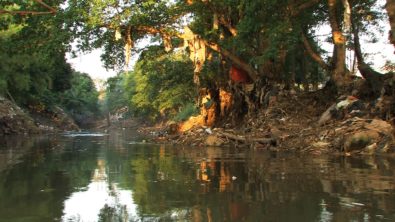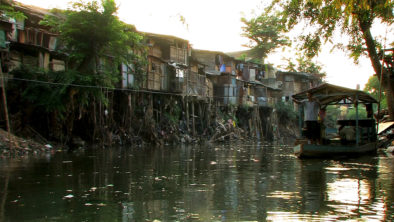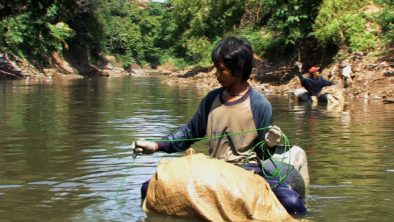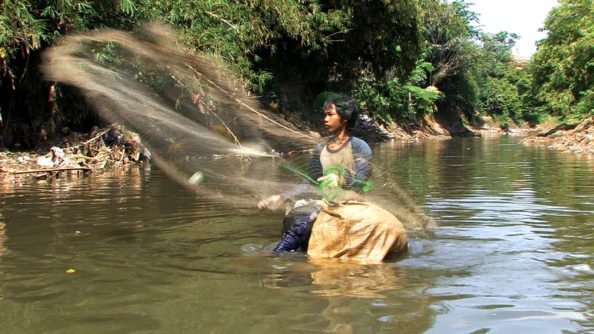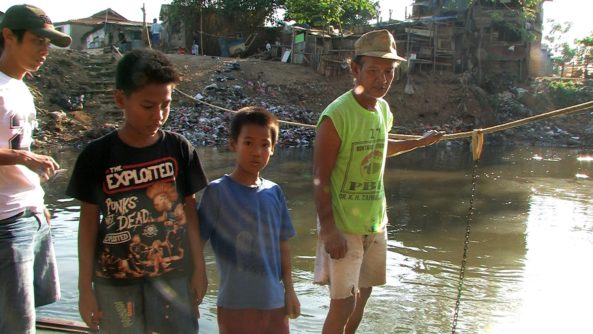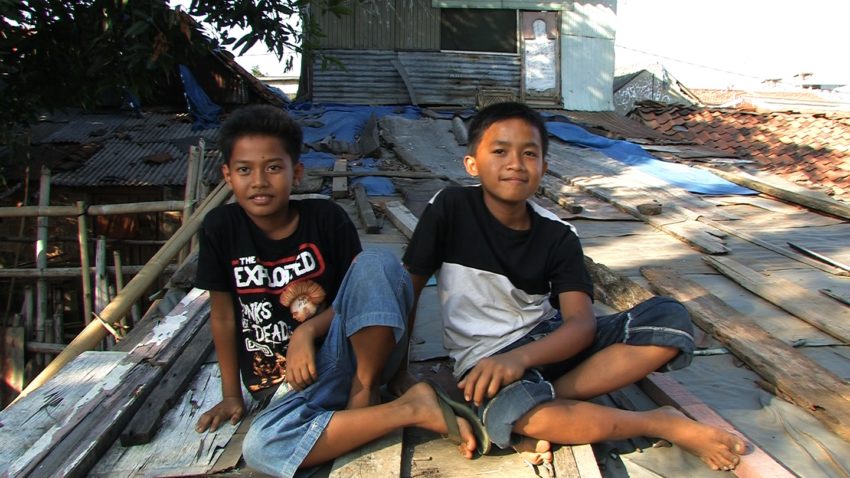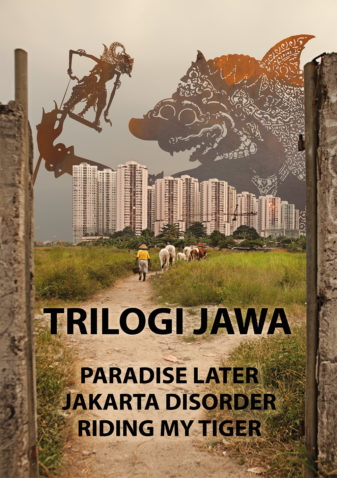
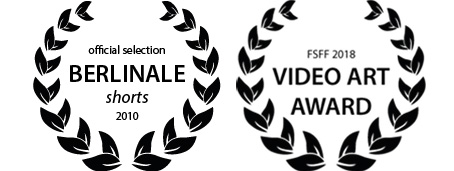
ABOUT
…Aber die Eroberung der Erde ist keine hübsche Sache, wenn wir ein bisschen genauer hinsehen. Was das Ganze für uns erträglich macht, ist nur die Idee – eine Idee dahinter, kein sentimentaler Vorwand, sondern eine Idee; und ein selbstloser Glaube an die Idee – etwas woran man sich halten und vor dem man sich verneigen und dem man auch Opfer bringen kann… – JOSEPH CONRAD, “Herz der Finsternis”, 1899)
Im Kopf eines Geschäftsreisenden befahren wir einen sich durch apokalyptische Landschaften schlängelnden Fluss. Ein Gedankenstrom reißt uns in einen Strudel aus Anklage, Verurteilung und Selbstrichtung. Wir steigen kurz aus – hinein in eine Wirklichkeit. Der Blick öffnet sich für einen Augenblick. Doch unser Käpt’n steuert uns wahnhaft einem fatalen Ende entgegen.
Paradise Later ist der erste Teil der Trilogi Jawa von Ascan Breuer.
„Einer der besten Beiträge des Kurzfilmprogramms, mit dem German Films den Nachwuchs bei seinem Auftritt in Cannes 2010 begleitete.“ – FILM DIENST
„Visuell eindrucksvoll, bewegend, unwiderstehlich: Die Musik, das Flimmern der Bilderwelt, es fließt und fließt. Der Film beeindruckt, indem er dokumentarisches Material mit dem Meilenstein der kongolesischen Kolonial-Gleichnisse wunderbar miteinander kombiniert. Er surft nicht weniger kraftvoll als Apokalypse Now Redux über Zitate, Schnippsel, repräsentativen Stichproben. Manchmal genügt sich der Sinn einer Sache selbst, und Paradise Later liefert ihn gekonnt. Was er zu sagen hat über das, was sich geändert und nicht geändert hat, ist lohnenswert, wenn auch düster.“ – Andrew Robertson, EYE FOR FILM
“Wer sich Paradise Later anschaut, braucht eine Denkpause. Die Botschaften bohren sich wie ein Schraubstock in die Gedankenwelt. Der Erzähler, ein Handelsdelegierter, heißt Sie als ‘geehrte Mitglieder der Gesellschaft’ an Bord willkommen. Die Mitreisenden geraten in den Strudel des Gedankenstromes eines Gefangenen des Wirtschaftssystems. Was wird er dem Vorstand seines Unternehmens berichten, wenn er aus diesem Nichts zurück kehrt? Von den Bäumen hängt Unrat wie Lametta herab und Verpackungen treiben auf dem trüben Wasser. Fischer werfen ihre Netze nach Verwertbarem oder Essbarem aus. Der logozentrische Blick des Erzählers, der alles versteht und einordnet, ohne einen offenen Dialog zuzulassen, legt sich als spürbare Arroganz über die Aufnahmen. Die durch den Soundtrack unwirklich anmutende Atmosphäre bricht kurz auf, als versuchten sich die „realen“ Geräusche und Stimmen der Umgebung gegen die Allmacht der Stimme zu wehren. So sehen die Mitreisenden erstmals die Menschen, die auf diesem kargen Landstrich leben. Ascan Breuer stellt Textpassagen von Joseph Conrads Roman Herz der Finsternis in einen Zusammenhang mit dokumentarischen Bildern. Breuer nutzt den über 100 Jahre alten Text mit einigen Abänderungen als zeitgenössischen Kommentar. Es ist kein Traum, in den sich die/der ZuseherIn begibt, sondern Apathie, die sich über den Schmerz des Erzählers legt. Sitzen wir bereits alle in einem Boot?” – Ute Mörtl, MALMOE
“Der Film lässt den Sinn von Conrads Roman weit lebendiger wieder auferstehen als Coppolas bombastische Verfilmung Apocalypse Now…” – TALKING PICTURES
Paradise Later – Trilogi Jawa I
Stream & Download | Verleih | Trilogi Jawa
Einblicke
TEXT
Annual report (111)
attn. Executive Board
Dear Society Members,
You know I hate and detest,
and can’t bear a lie
– not because I am straighter than the rest of us,
but simply because
it appals me.There is a taint of death,
a flavour of mortality in lies.
It makes me miserable and sick,
like biting something rotten would do.I have a voice,
and for good or evil
mine is the speech that cannot be silenced.Of course, a fool,
what with sheer fright
and fine sentiments,
is always safe.But within me
a battle is raging
for the possession of my soul.I have realized:
it is a soul satiated with primitive emotions,
avid of lying fame,
of sham distinction,
of all the appearances of success and power.Sometimes I’m contemptibly childish.
I desire to have heads of state
welcome me in the lobbies of Davos
on my return from this ghastly Nowhere,
where I once intended
to accomplish great things.Until now
I believed
that if I showed you
I have in me
something
that is really profitable,
then there will be no limits to the recognition of my ability.Of course
I must take care of the right motives.
Right motives – always.You want a deliberate belief.
An appeal to me out here
– and for you,
in the headquarters of the world order.For you I am one of the Workers.
But at the same time something like an emissary of light,
something like a lower sort of apostle.You know, there is a lot of such rot
let loose in the upper floors…The conquest of the earth is not a pretty thing when you look into it too much.
What saves us is efficience
– the devotion to efficiency.
What redeems it is the idea only.
An idea at the back of it;
not a sentimental pretence but an idea;
and an unselfish belief in the idea
– something you can set up, and bow down before,
and offer a sacrifice to…We are the forerunners of change,
of conquest,
of trade,
of massacres,
of blessings.
…this choice of nightmares
forced upon this land
invaded by these mean and greedy phantoms,
of which I am one.Our administration is merely a squeeze, and nothing more.
We are conquerors,
and for that you want only brute force
– nothing to boast of, when you have it,
since your strength
is just an accident
arising from the weakness of others.We grab what we can get
for the sake of what is to be got.It is just robbery with violence,
aggravated murder
on a great scale,
and we going at it blind,
as is very proper for those who tackle a darkness– reckless without hardihood,
greedy without audacity,
and cruel without courage;there is not an atom of foresight
or of serious intention,
and we don’t seem aware these things are wanted
for the work of the world.
To tear treasure out of the bowels of the land is our desire,
with no more moral purpose at the back of it
than there is in burglars
breaking into a safe.The earth seems unearthly.
We are accustomed to look upon the shackled form of a conquered monster, but here
– here I can look at a thing
monstrous and free.Things have taken on a life of their own.
Do you see the story?
Do you see anything?
It seems to me I am trying to tell you a dream.I wonder whether the stillness on the face of the immensity looking at us
is meant as an appeal
or a menace.What are we who has strayed in here?
Can we handle that dumb thing?
Or is it already handling us?
I feel how big,
how confoundedly big, is that thing
that can’t talk,
and perhaps is deaf as well.Every extreme grief may ultimately vent itself in violence
– but more generally takes the form of apathy.Knowing this, we believe ourselves safe.
Fear is on our side
restraining it.But there is a grief we can not appease.
No fear can stand up to hunger,
no patience can wear it out,
disgust simply does not exist where hunger is;
and as to superstition,
beliefs,
and what you may call principles,
they are less than chaff in a breeze.Don’t you know the devilry of lingering starvation,
its exasperating torment,
its black thoughts,
its sombre and brooding ferocity?
It takes all your inborn strength to fight hunger properly.
It’s really easier to face bereavement,
dishonour,
and the perdition of one’s soul.Sad, but true. These people, too,
have no earthly reason for any kind of scruple.
But this is the fact facing me
– dazzling and irritating.But trust my words:
They will come!
They will come after us.Why aren’t you coming after us?
Lyrics by Joseph Conrad, taken from the novel “Heart of Darkness” (1899), remixed & mashed up by Ascan Breuer (2010)
Team
Ein Film von Ascan Breuer & Victor Jaschke
Konzept/Montage: Ascan Breuer
Kamera: Victor Jaschke
Sound/Musik: Sven Töllner
Sprecher: Tony Dunham (englisch), Martin Aleida (indonesisch), Ascan Breuer (deutsch)
Übersetzung: Martin Aleida (ind.), Ascan Breuer (dt.)
Produktion: Ascan Breuer, Victor Jaschke

